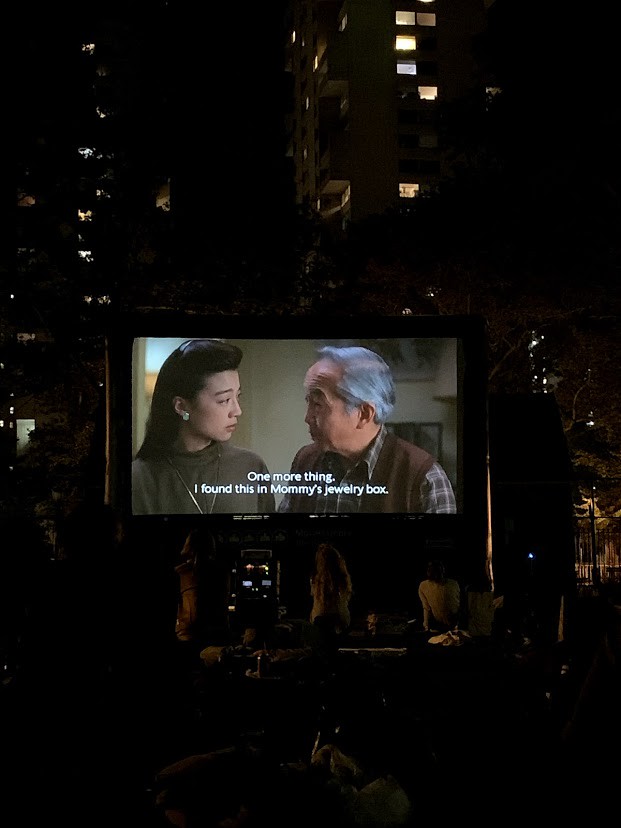The Joy Luck Club was screening last night at Columbus Park. It was free and I was free, so I went to see it!
Why not! After all these years thinking about JLC, I wondered if it wasn’t probably about time to update my impressions about the film. To me, it was this movie telling the story of Chinese Americans with values stuck in time. The setting was one that I have not known in my family, which emigrated mostly to come study in Canada or France, and didn’t exactly have to escape war and hardship, were in abusive relationships or felt the pressure to assimilate.
Google for Joy Luck Club criticism and there goes your Saturday night. I had not seen The Joy Luck Club since probably the early 2000s, or even the 90s, when I was a teenager growing up in Quebec. The movie was maybe dubbed in French (Le Club de la chance), but I don’t remember. Least to say, if it was showing on late weekend night on Radio-Canada TV (going by my memory, which I’ll come back to later), it was because it had achieved mainstream recognition among Western audiences.
The JLC was the only Asian-American movie growing up. Based on a 1989 novel by author Amy Tan and directed by Wayne Wang, the 1994 feature was produced by a major American film studio.
The scene of the watermelon above was what I remembered the most. During the same segment (one of the four mother-daughter relationships), there was probably one of the most horrible characters, one of the un-redeemable Asian males of the film, Harold.

Lena, one of the daughters of the JLC marries Harold, is at his mercy financially (he’s her boss!). He’s the guy who splits up everything 50-50, which is cool in theory, but where she ends up paying a lot more (for her personal items on her own, while paying for his ice cream that she doesn’t eat). What a jerk. The point was that it’s an implausible relationship, and so wtf.
(It mirrors the marriage that her mother had with the watermelon guy, who is hands down the most horrible guy in the film.)
She eventually divorces Hasshold and has a new hot and cool boyfriend… What I didn’t remember was that he was Asian! Yeah, there’s that recollection that I had going on that she had a horrible Asian husband, therefore she must’ve started dating someone else, as if race had anything to do with it. My selective memory didn’t register that her new beau, in the narrative’s present day, was actually played by Asian American actor Philip Moon.

There were also some quite horrible white characters, like the parents of Ted, who try to intimidate Rose, the daughter character played by Rosalind Chao, into not dating their son anymore. The mother was the one delivering the message, but you could equally place the blame on the father.
Was the movie a satirical comedy? I don’t know. At times the tone made it feel like one. Take the scene where the successful Waverly, played by Tamlyn Tomita, throws her condoms and her boyfriend’s clothes in the face of her mother. She “tried to marry a Chinese guy” was probably one of the worst lines (does it mean if you marry someone of your race, you do what your family wants and not what you want?). Her bumbling new white boyfriend Rich is a riot, splattering caricatural cultural ignorance at the first meet-the-parents dinner.
It wasn’t what the tone I took home during my first watch twenty to thirty years ago. It’s a work of fiction, and it’s fine to be dramatic and introduce elements of fantasy. I think where it hurts (and one of the reasons why the movie was so polarizing) was that it was the only Asian American movie during a very long period and it was caricatural, but wasn’t clear about it. So maybe these elements are taken at face value, and generalized to the lives of all Chinese immigrants coming to America, in the imaginary of those who consume only mainstream media?
(Also, the reliance on fabulism, or the belief in, as a plot device, wth with that?!)
The people outside of the mothers and daughters in this movie are generally failing, horrible or plain antagonistic, but there was a character I forgot who was extremely sympathetic. At the end of the movie, June, played by Ming-Na Wen, whose mother lived a tragic life before coming to America (this film’s idea of Promised Land), was going to go to China to meet her long-lost half-sisters. Unsure of what she would do to explain the death of their mother that the sisters were unaware of, her dad gives her old photos of her mom, a swan feather and a pep talk about a mother’s hope.

While it won’t be the best movie for me to ever to recommend, it has significance to Asian Americans, especially Chinese Americans (since it tells the story of immigrants from China). It’s a movie to watch if you want to understand the place given to hyphenated Asians in America. It’s also important for seeing the context that Crazy Rich Asians, Always Be My Maybe came to existence in 2018-19.
If you have a chance to see it again, you could benefit, like I did, from having a new perspective on the JLC.

Chinese guys get a big shellacking here.